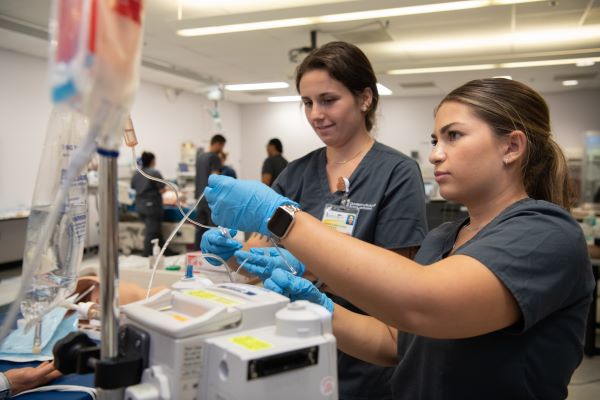UMSON Launches New Entry Master’s Program to Advance Careers in Nursing

Baltimore, Md. – The University of Maryland School of Nursing (UMSON) will launch its new Master of Science in Nursing (MSN) Entry-into-Nursing (MSN-E) program next spring. The two-year, in-person, full-time MSN-E program is designed for those with bachelor’s degrees in fields other than nursing who are interested in changing patient care, improving patient outcomes, and leading health care teams, and it will position nurses to grow in their careers. It will also teach students how to engage in self-care practices, incorporating self-reflection and feedback from others, to promote personal and professional resilience and well-being.
The new program responds to alumni and student feedback to provide a more flexible curriculum while aligning it with the American Association of Colleges of Nursing’s (AACN) The Essentials: Core Competencies for Professional Nursing Education, which provides a framework for nursing education using a competency-based approach. As part of UMSON’s ongoing effort to overhaul curricula at both the baccalaureate and advanced levels to align with AACN’s Essentials, the new MSN-E program will focus on competency-based education (CBE), a student-centered approach that focuses on demonstrating knowledge, skills, and attitudes. Nursing graduates with the competencies outlined in the Essentials will be well prepared to take the Next Generation NCLEX, the newest version of the National Council Licensure Examination, which is designed to assess clinical judgment in nursing licensure candidates, measuring future nurses’ ability to think critically about how to care for patients. CBE effectively develops critical-thinking and judgment skills in graduates, enhancing their chances of passing the licensing exam and thriving in their nursing careers.
This fall is the final semester in which UMSON admitted students to its nearly 20-year-old MSN Clinical Nurse Leader (CNL) option; as of spring 2024, UMSON will no longer offer it to incoming students and will offer the MSN-E program instead.
“The new MSN-E maintains the strengths of the CNL option while anticipating and responding to changing forces in nursing education and practice,” said Janet Wulf, DNP ’19, MS ’06, RN, CNL, CHPN, CNE, assistant professor and director of the entry master’s program. “Through elective choices, students will tailor their education to their interests and experience. We see this as a springboard into the nursing profession and we can’t wait to see where our graduates land.”
The program will provide more elective options than the CNL option does, and it will require 900 clinical hours. It will offer pathways to a doctorate, a certificate, a nursing specialty, or deeper exploration of a variety of topics. Some of the pathways will allow students to take courses they can apply toward a future degree or certificate.
###
The University of Maryland School of Nursing, founded in 1889, is one of the oldest and largest nursing schools in the nation and is ranked among the top nursing schools nationwide. Enrolling more than 2,000 students in its baccalaureate, master’s, and doctoral programs, the School develops leaders who shape the profession of nursing and impact the health care environment.